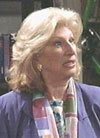Many years ago, I wrote a story about a group of college students who were fans of the “Honeymooners” television series. These students hadn’t been born in the 1950s when the show had its initial run, but they couldn’t get enough of it. Although I do the same thing with “The Honeymooners” and some other vintage shows, I asked them why they watched the episodes so often that they could recite most of the dialog, and they told me that the way the writers and actors used language was one of the things that fascinated them.
Fast forward to “Seinfeld,” which still holds my interest partly because of the way the writers and actors used language — for instance, a particular device, very New York to my ear, used to evoke comparisons. This phraseology was used seven times in the series — five times by Jerry speaking to George or Elaine, once by Helen Seinfeld speaking to Jerry, her son, and once by George, speaking to Elaine.
The one instance in which Jerry wasn’t the speaker occurred in the series premiere, “The Stakeout,” in which Jerry tries to flirt with a woman he meets at a dinner party, annoying Elaine, who is, in effect, his date at the party. The next day, when Jerry’s visiting mother tells Jerry that Elaine called while he was out, he asks, “What was the tone of her voice? How did she sound?” To which Helen replies: “Who am I — Rich Little?”
In the episode known as “The Jacket,” Jerry makes a reference to composer Robert Schumann, but mispronounces the name, putting the accent on the first syllable. George says, “Artie Schumann, from Camp Hatchapee?” To which Jerry answers, “No, you idiot!” And George says, “Who are you — Bud Abbott? Why are you calling me an idiot?”
In “The Trip,” in which Jerry invites George to accompany him on a trip to Los Angeles, George arrives at Jerry’s apartment with a big pile of luggage. Jerry looks at the bags and says: “It’s a three-day trip. Who are you — Diana Ross?”
In “The Revenge,” George plans to get back at the boss who fired him from a real estate firm by slipping the boss a “mickey” at the firm’s anniversary party. When George reveals this plan, the incredulous Jerry says: “Who are you — Peter Lorre?”
In “The Wink,” Elaine tells Jerry that she has agreed to go on a date with the man who calls from her wake-up service. Jerry says: “I still can’t believe you’re going out on a blind date.” Elaine answers: “I’m not worried. It sounds like he’s really good-looking.” To which Jerry answers: “You’re going by sound? What are we — whales?”
And in “The Limo,” Jerry and George find themselves in a limousine with two neo-Nazis who think George is their leader. George suggests that they extricate themselves by jumping out of the moving car. “We’re doing sixty miles an hour!” Jerry says. “So we jump and roll,” George explains. “You won’t get hurt.” And Jerry replies: “Who are you — Mannix?”
Finally, in the episode in which NBC president Russell Dalrymple gets food poisoning after Elaine sneezes on his pasta primavera, George has a tumultuous session with his counselor, Dana, played by Gina Hecht. During the session, Dana tells George that she read the script for a sit-com pilot Jerry and George have pitched to NBC, and she was not impressed. When George repeats this to his friends, Elaine — who recommended Dana — says, “Maybe she didn’t think it was funny,” to which George replies, “Oh, she didn’t think it was funny? What is she – Rowan and Martin?”
Who are you? Who am I? A very “exerstential” question, as Elaine Benes observed.
For a list of actual people referred to in “Seinfeld” scripts, click on THIS LINK.





